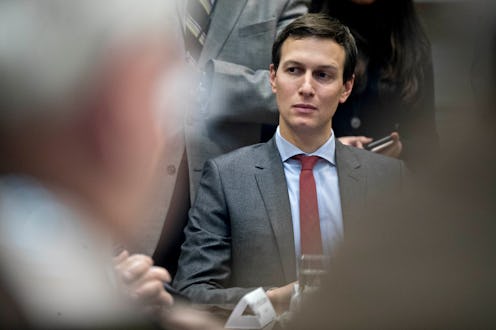News
Jared Kushner's Appointment Seems To Be Legal

Donald Trump raised more than a few eyebrows when he gave his daughter Ivanka an official White House office and security clearance last week. Now, he's causing even more controversy by appointing her husband, Jared Kushner, to lead a new White House agency that will overhaul the federal government by proposing business-oriented solutions. But the legality of Kushner's role in the new Office of American Innovation has been called into question, as was his appointment as White House senior adviser in January.
It's easy to ask whether Kushner's appointment is legal, but the answer isn't quite so simple for a few reasons. Mostly, it's because American anti-nepotism law is murky, and there's a lot of grey area that has to be examined to determine whether or not the law is being violated by a sitting president. The law was established in 1967 under the Johnson administration, and states:
A public official may not appoint, employ, promote, advance, or advocate for appointment, employment, promotion, or advancement, in or to a civilian position in the agency in which he is serving or over which he exercises jurisdiction or control any individual who is a relative of the public official.
What makes things complicated is the definition of "agency" in this context. There's a lot of dispute about whether the White House itself is considered an agency that the President presides over. Legally, the current consensus is no, it isn't. Ironically enough, that's largely because of Hillary Clinton.
Back in 1993, when Bill Clinton was President, he appointed First Lady Hillary Clinton to lead the Task Force on National Health Care Reform, a controversial decision that led to a lawsuit being filed in D.C. Circuit Courts. While the lawsuit wasn't specifically about nepotism (it was focused on public records), the judges ruled in their decision on the case that nepotism laws refer exclusively to Cabinet positions, like Attorney General and Secretary of State.
This definition may or may not be legally binding because the ruling didn't necessarily relate to the central argument of the case (remember, the lawsuit was about disclosing public records, not nepotism). But this definition has been used as precedent for any decisions about nepotism in government, and, unless this precedent is challenged by another ruling or the Supreme Court, it is likely that anti-nepotism laws will only apply to Cabinet positions in the future.
Kushner's new role as the head of the White House Office of American Innovation is not a Cabinet position, and therefore, based on current legal consensus and precedent, does not violate the anti-nepotism statute. Still, his appointment has already generated controversy, and there's always a chance that the legal consensus on nepotism can be challenged in the future.